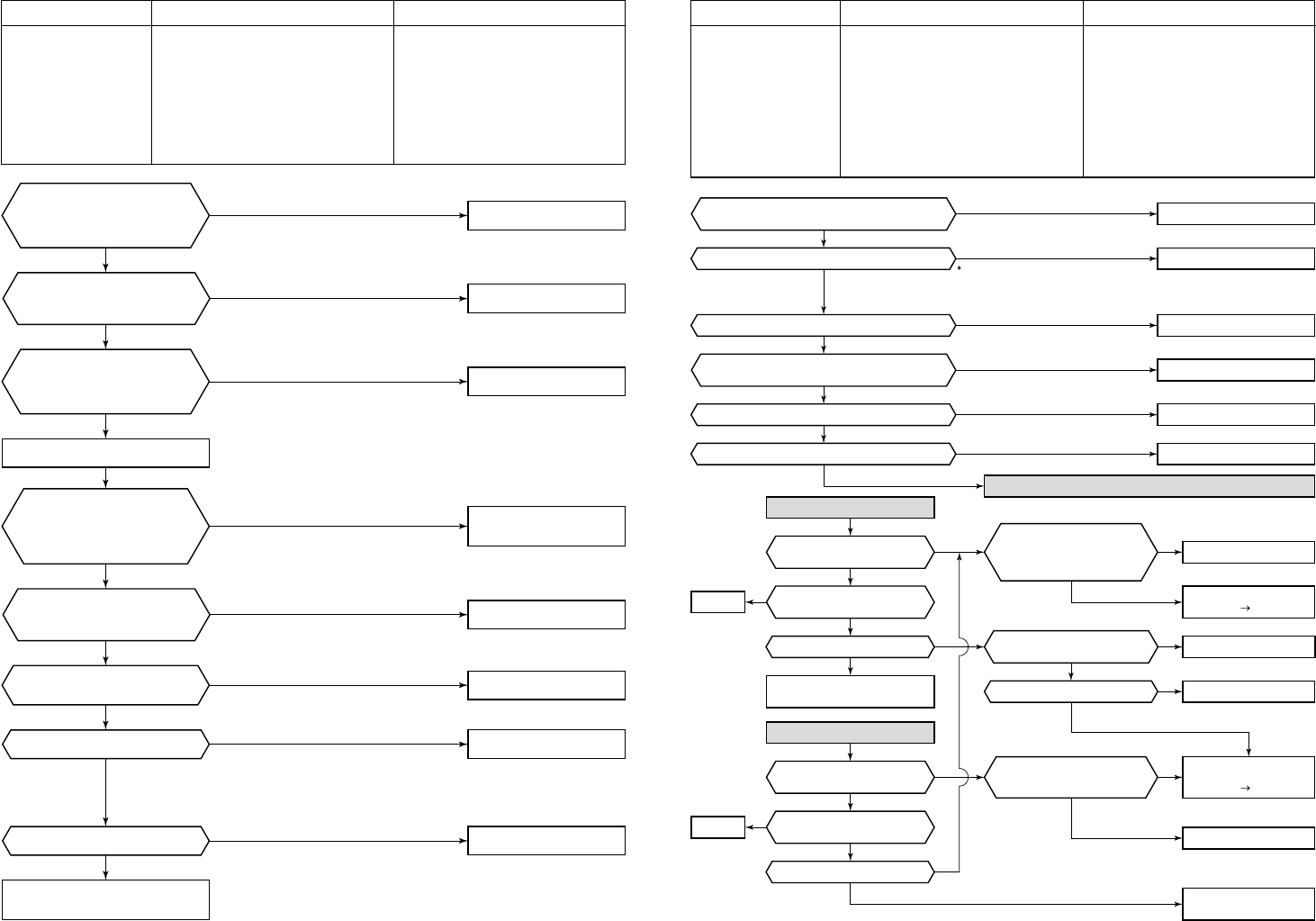
147
Check code
[H04] / [44]
(TCC-L / AI-NET)
[H14] / [44]
(TCC-L / AI-NET)
Check code name
Compressor 1 case thermo operation
Compressor 2 case thermo operation
Cause of operation
1. Case thermo circuit error
2. I/F P.C. board error
3. Service valve closed
4. Outdoor PMV clogging
5. SV4 valve leak, Coil misinstallation
6. 4-way valve error
7. Compressor error
8. Refrigerant shortage
(Note 1)
1. Case thermo is usually closed.
2. Operation temperature of case thermo is 120˚C.
(After checking there is no slogging or pipe breakage, charge refrigerant again.)
(Note 2) Check the following items mainly.
1. Existence of abnormal sound and abnormal vibration during operation or when starting
2. Abnormal overheat of case during operation or stop (Do not touch.)
3. Current of compressor during operation or starting (No rapid current change)
SV4 valve: Connector CN311, Blue
Connector CN300, 301, White
Is compressor normal? (Note 2)
Is flow selector unit normal?
Repair case thermo circuit.
Are service valves of
gas pipe and liquid pipe of
outdoor unit fully opened?
Does not refrigerant
bypass from discharge to
suction through 4-way valve?
Refrigerant shortage,
clogging, pipe breakage
Is case thermo circuit normal?
1. Connector connection
2. Wiring
3. I/F P.C. board (Note 1)
Open service valves fully.
Repair outdoor PMV.
Correct SV4, SV5, SV11
valve circuits.
Check 4-way valve.
Check piping.
Compressor error
Start operation.
Are outdoor PMV1/2/3 normal?
1. Connector connection
2. Wiring 3. Coil
4. Valve body 5. I/F P.C. board
Are SV41 and SV42
Valve circuits normal?
1. Incorrect installation and
connection of SV41 and SV42
2. Leakage from SV41, 42 circuit
NO
YES
YES
YES
YES
YES
YES
YES
NO
Check flow selector unit.
YES
NO
NO
NO
NO
NO
NO
Is not refrigerant bypassed
from discharge to suction?
Check code
[H06] / [20]
(TCC-L / AI-NET)
Check code name
Low-pressure protective operation
Cause of operation
1. Service valve close
2. Ps sensor error
3. SV2, SV4 circuit error
4. Miscabling of communication between
indoor and outdoor
5. Indoor/outdoor fan and condenser error
6. Indoor/outdoor PMV clogging
7. Indoor/outdoor heat exchanger clogging
8. Refrigerant shortage
Is there clogging of the valve?
Is outdoor fan operating
normally in heating season?
1 Pressure by pressure gauge (Check joint)
2 Pressure display on 7-segment display
3 Output voltage of I/F P.C. board
If 1 and 2, 3 are different, an error of pressure sensor error is considered.
If 2 and 3 are different, check I/F P.C. board.
Check wiring, installation and
connection.
(Check with miswiring check
function of outdoor unit.)
YES
YES
YES
YES
YES
YES
NO
YES
YES
YES
YES
YES
YES
NO
NO
NO
NO
NO
NO
YES
NO
NO
NO
NO
NO
NO
NO
Open service valves fully.
Exchange low-pressure sensor.
Correct SV2 and SV4 circuits.
Correct cabling.
Are characteristics of low-pressure sensor normal?
Is indoor unit connected to different refrigerant systems?
Is flow selector normal?
Are SV2 and SV4 circuits normal?
Are service valves of gas and
liquid pipe of outdoor unit fully opened?
Is there mispiping of discharge gas
and suction gas main pipes?
Does indoor fan operate
normally in cooling season?
Is outdoor PMV normal?
Is indoor PMV normal?
(A) Cooling
Is there clogging of indoor
air filter or heat exchanger?
Is there clogging of
outdoor heat exchanger?
Is connection
or coil normal?
YES
YES
NO
NO
Check indoor P.C. board.
Failure Replace
YES
Correct piping.
Check flow selector.
Repair faulty parts.
Repair faulty parts.
Replace PMV body.
Repair faulty parts.
Are following items normal?
1. Connection
2. Condenser
3. Motor
4. Fan
Cleaning
In cooling season, go to (A), In heating season, go to (B)
Check outdoor
I/F P.C. board.
Failure Replace
Refrigerant shortage,
clogging, pipe deformed
Refrigerant shortage or,
clogging or pipe deformed
(B) Heating
Cleaning
Is indoor fan system normal?
• Fan cracked
• Fan loose


















